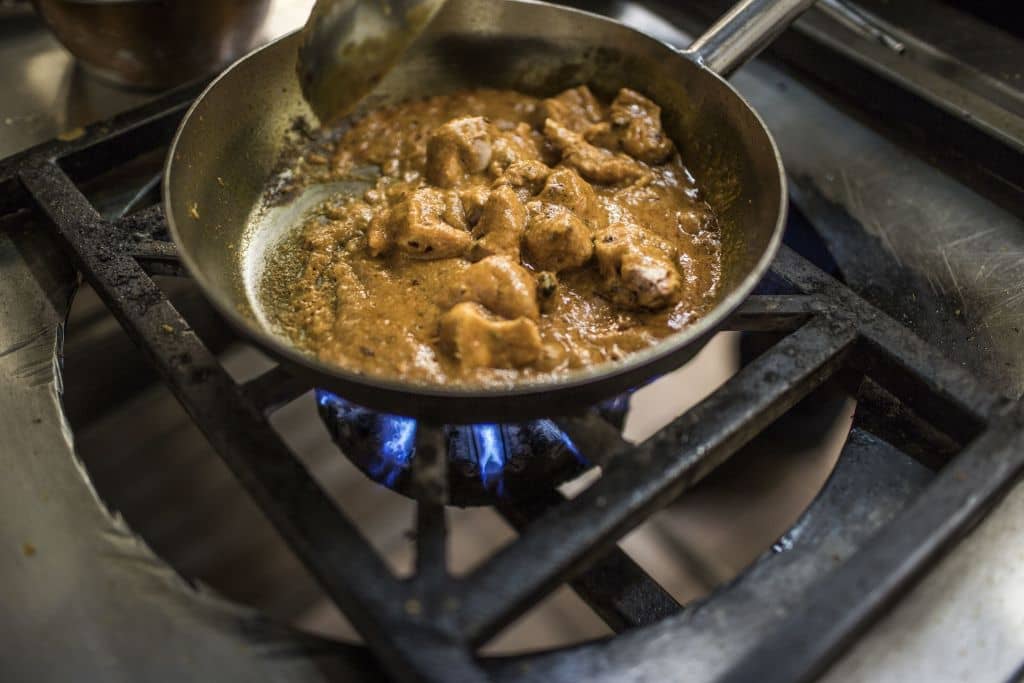The latest casualty in the culture wars is an innocent-sounding word: ‘curry’. Apparently it’s inappropriate to use it, and incorrect to use it to refer to all spicy Indian food. It’s far too broad as to be misleading, doesn’t even have pan-Indian usage, and it remains tainted by its colonial origins. This is the widely reported opinion of Chaheti Bansal, a Californian blogger who posts Indian recipes on Instagram.
‘There’s a saying the food in India changes every 100km and yet we’re still using this umbrella term popularised by white people who couldn’t be bothered to learn that actual names of our dishes’, she writes, imploring people to ‘unlearn’ the term.
The word was indeed made popular by colonialists: the Portuguese. As the chef-owner of Darjeeling Express, Asma Khan, explained to the Daily Telegraph this week, the word has its origins in Goa, an area of the sub-continent first taken by the Portuguese in the 15th century.
When they asked the locals what they were eating, they replied ‘kari’, a Tamil word which refers to the gravy that a particular dish is finished with (but ‘vindaloo’ is entirely Portuguese, coming from vin d’alho – ‘garlic wine’.) Kari is first encountered by English-speakers in a mid-17th century Portuguese cookbook found by members of the British East India Company, and assumed the anglicised form a century later.
Languages in general take words from each-other. English is a prime example
The catch-all term in reference to all spicy foreign food, says Khan, is ‘lazy, and laziness breeds ignorance’. Madhur Jaffrey, author of the 1973 classic, An Invitation to Indian Cooking, agrees, with more nuance:
‘People are very scared of being accused of cultural appropriation…but I think the blogger does have a point.’
To use it to refer to all Indian food is not wrong, however. It’s fine in English. It’s only incorrect if you are speaking a Tamil language.
After all, words borrowed from foreign languages often change their meaning. ‘Comedian’ comes from the French word for ‘actor’. Italians don’t normally use the word ‘pasta’ as we do. In its original language ‘pasta’ usually denotes ‘dough’ or ‘pastry’. Italians don’t refer to the generic here, but to the specific, ie, tagliatelle, spaghetti, etc. Not so long ago we in Britain often used ‘spaghetti’ as a generic term for pasta, and when pizza (Italian plural: ‘pizze‘) first became popular in the 1950s it was called ‘Italian rarebit.’
Languages in general take words from each-other. English is a prime example, with many Latin-origin words imported after the Norman Conquest, and invented during the Latin craze of the 18th century. And languages also often differentiate from the generic and the specific. In the park opposite me, every day I walk past a tree. I also walk past an oak. Both usages are correct, just as last week I had a curry which was also a tikka masala.
Cultures similarly borrow the cuisine of each other and reinterpret it, with the British chicken tikka masala being the most celebrated example; the balti was invented in Birmingham. There are now restaurants in India serving anglicised versions of South Asian cuisine.
A ham and pineapple pizza, or any topping, is offensive to older Italian and horrifies Neapolitans. Marks and Spencer was doing nothing new with its vegan biryani, similarly criticised by the ignorant as ‘inauthentic’. Jamie Oliver offended many purists in Spain in 2016 by adding chorizo to paella. This was ironic given that ‘paella’ is not even a Spanish word. It’s Catalan, a different Romance language. In Germany they have the splendid ‘Currywurst’, surely an outrageous example of cultural appropriation from the Portuguese/English/Tamil.
To proscribe a word on account of its colonial origins – those monsters, the Portuguese – would set a peculiar precedent. Bungalow, bangle, cot, dinghy, dungarees, guru, juggernaut, jungle, nirvana, punch (the drink), pyjamas and thug – among many other words which come from Hindi or Urdu alone – would all presumably be ruled off limits. Then there are words from other lands the British conquered, such as bog, colleen, galore, phoney, smithereens – all from Irish – or words from African languages, such as chimpanzee, cola and jazz.
Announcing that you disapprove of a word owing to its provenance is similar to when politicians make historical apologies. It’s gesture politics that doesn’t change anything, addressing a problem that doesn’t exist. ‘It doesn’t offend me as a word, and it doesn’t constitute a slur,’ says Khan.
In any case, trying to eradicate words imported from foreign languages is notoriously difficult. The French have been trying to exorcise English words for decades, to no effect. I can’t see curry houses changing their names in a hurry because of this latest outbreak of ludicrous wokery.






Comments